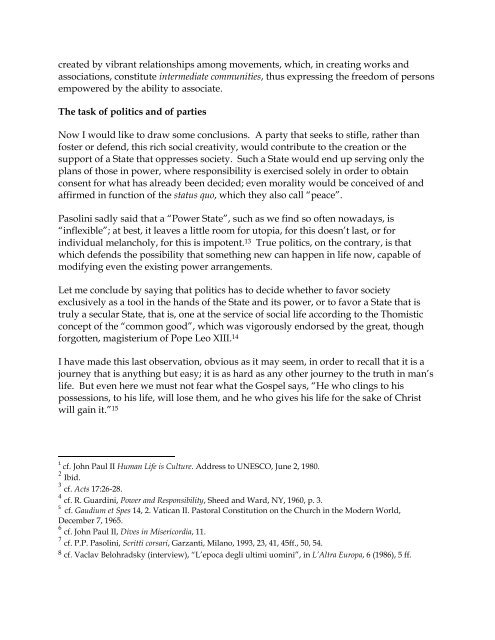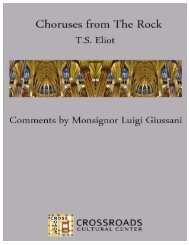The Religious Sense, Works, and Politics - Crossroads Cultural Center
The Religious Sense, Works, and Politics - Crossroads Cultural Center
The Religious Sense, Works, and Politics - Crossroads Cultural Center
You also want an ePaper? Increase the reach of your titles
YUMPU automatically turns print PDFs into web optimized ePapers that Google loves.
created by vibrant relationships among movements, which, in creating works <strong>and</strong>associations, constitute intermediate communities, thus expressing the freedom of personsempowered by the ability to associate.<strong>The</strong> task of politics <strong>and</strong> of partiesNow I would like to draw some conclusions. A party that seeks to stifle, rather thanfoster or defend, this rich social creativity, would contribute to the creation or thesupport of a State that oppresses society. Such a State would end up serving only theplans of those in power, where responsibility is exercised solely in order to obtainconsent for what has already been decided; even morality would be conceived of <strong>and</strong>affirmed in function of the status quo, which they also call “peace”.Pasolini sadly said that a “Power State”, such as we find so often nowadays, is“inflexible”; at best, it leaves a little room for utopia, for this doesn’t last, or forindividual melancholy, for this is impotent. 13 True politics, on the contrary, is thatwhich defends the possibility that something new can happen in life now, capable ofmodifying even the existing power arrangements.Let me conclude by saying that politics has to decide whether to favor societyexclusively as a tool in the h<strong>and</strong>s of the State <strong>and</strong> its power, or to favor a State that istruly a secular State, that is, one at the service of social life according to the Thomisticconcept of the “common good”, which was vigorously endorsed by the great, thoughforgotten, magisterium of Pope Leo XIII. 14I have made this last observation, obvious as it may seem, in order to recall that it is ajourney that is anything but easy; it is as hard as any other journey to the truth in man’slife. But even here we must not fear what the Gospel says, “He who clings to hispossessions, to his life, will lose them, <strong>and</strong> he who gives his life for the sake of Christwill gain it.” 151 cf. John Paul II Human Life is Culture. Address to UNESCO, June 2, 1980.2 Ibid.3 cf. Acts 17:26-28.4 cf. R. Guardini, Power <strong>and</strong> Responsibility, Sheed <strong>and</strong> Ward, NY, 1960, p. 3.5 cf. Gaudium et Spes 14, 2. Vatican II. Pastoral Constitution on the Church in the Modern World,December 7, 1965.6 cf. John Paul II, Dives in Misericordia, 11.7 cf. P.P. Pasolini, Scritti corsari, Garzanti, Milano, 1993, 23, 41, 45ff., 50, 54.8 cf. Vaclav Belohradsky (interview), “L’epoca degli ultimi uomini”, in L’Altra Europa, 6 (1986), 5 ff.



